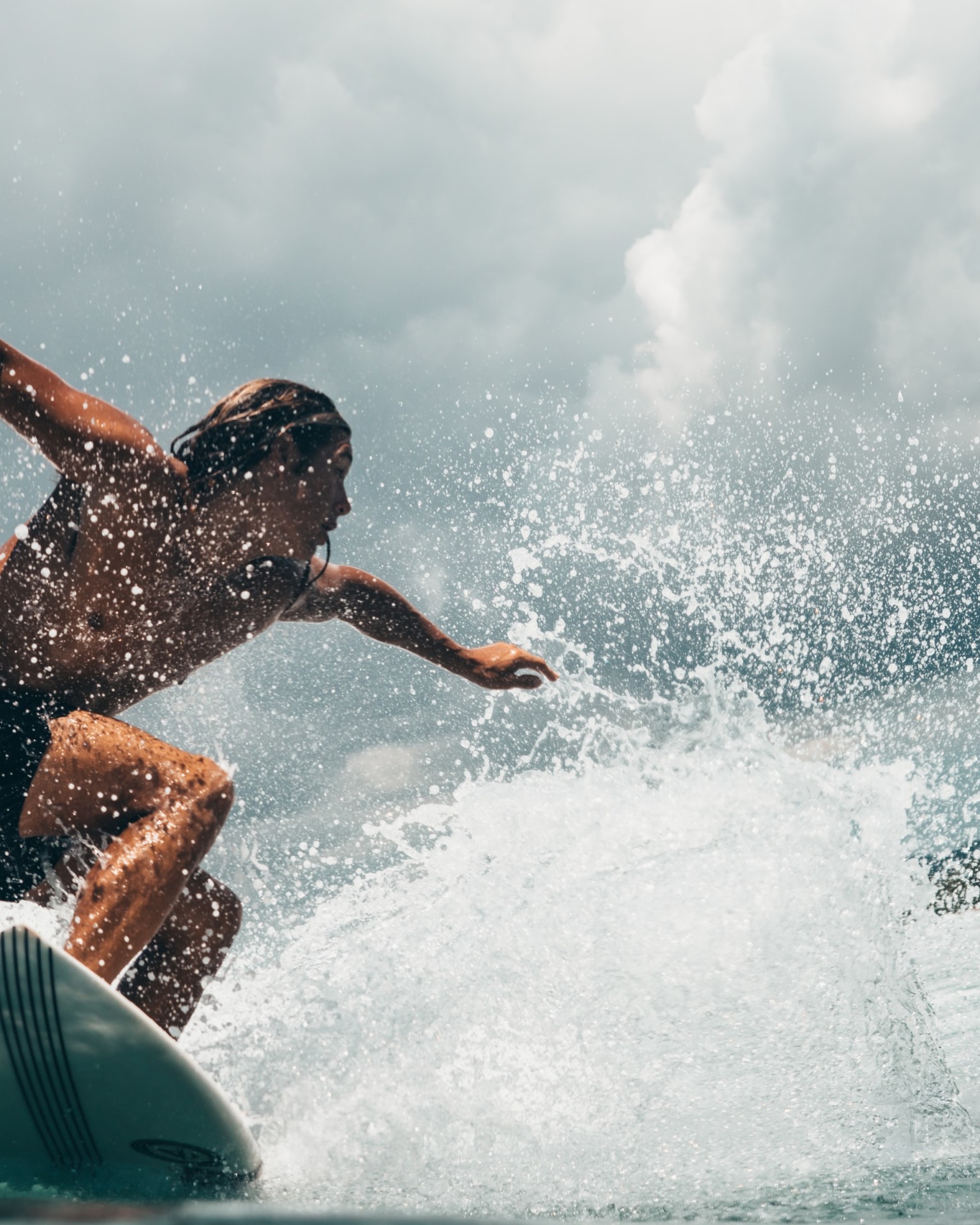Have you ever noticed that there seems to be a trend around the surfing world that most people have long curly, messy, and blond hair?
Commonly known as “surfer’s hair”, this look is less of a chosen hairstyle and more of a result due to long periods of time in saltwater and under the sun.
The minerals in ocean water such as chloride, sodium, magnesium, and sulfate increase the cross-links between hair proteins, thus curving your hair and increasing its wavy look.
This, along with the added attraction of salt crystals, is the reason that it is so common for surfers to have wavy hair.
Below we will look at how surfing affects your hair, what you can do to protect it while surfing, and how you can achieve that perfect surfer’s hair look.
- Does Surfing Make Your Hair Curly?
- Does Surfing Affect My Curly Hair?
- What Does Surfing Do to Your Hair?
- Does Surfing Make Your Hair Blonde?
- Is Surfing Bad for Your Hair?
- 6 Tips to Protect Your Hair as a Surfer
- Why Do Surfers Have Long Hair?
- How Can I Get Curly “Surfer Hair”?
- Conclusion
- You Might Also Like…
Does Surfing Make Your Hair Curly?
Surfing can make your hair curly, however, it is good to know that it will not make your hair naturally curly.
If you have perfectly straight hair, do not expect hours of surfing to give you those curls you have always wanted.
Although saltwater has a tendency to dry out your hair, and therefore tighten it up if you do not have curly hair, it is less likely to do so.
To understand this it is better to have an idea of why some hair is curly and other hair is straight.
Why Is Some Hair More Curly Than Others?
In short, curly hair comes down to two things; The root and the hair shaft.
With short hair, the follicles (roots) of the hair tunnel vertically into the scalp, while if the follicle enters the scalp at an angle it will grow out curly.
However, it is not the follicles of your hair that is affected by the ocean, it is the shaft.
The strands of hair that you see are stuffed with dead cells which are packed with a protein called keratin.
Keratin is made up of amino acids called cysteine. Cysteine contains a sulfur group which allows it to bond to additional sulfur-containing molecules.
Therefore, the cysteine can bond with other cysteine molecules further down the hair, resulting in a curly look.
Curly hair has more of these bonds. The more keratin your hair contains and the closer together the amino acids are, the curlier your hair will be.
In this sense, surfing does not make your hair curly.
However, it will increase the curls that already exist in your hair.
Does Surfing Affect My Curly Hair?
Taking into consideration the above information, surfing will certainly affect your curly hair.
As the cysteine amino acids are closer together than straight hair, the ions in the saltwater will encourage molecular bonding between the proteins.
As a result, spending time in saltwater and not fully rinsing out your hair when the surf is done will leave you with tighter curls and a full-bodied look to your locks.
What Does Surfing Do to Your Hair?
When surfing, three major impacts are made to your hair; drying out from the salt, added minerals from the sea, and bleaching from the sun.
Surfing Dries Out Your Hair
Salt is hygroscopic, meaning that because of its positive ion charge it can draw in water from the atmosphere.
In short, salt attracts water.
When you spend time in the ocean, the salt from the sea draws out the moisture from your hair and scalp, leaving it dry.
Over time, this leads to dry, damaged, and frizzy hair.
It is partly because of the lack of moisture that surfers tend to have stiff, straw-looking hair instead of soft, flowy hair.
Sea Water Adds Minerals to Hair and the Scalp
The ocean is full of salts and minerals such as magnesium, potassium, and selenium.
Over prolonged periods, these minerals and vitamins are absorbed into the scalp which can aid in soothing itchy dry heads, as well as add body to the hair.
One study looked at DSW (deep seawater) and its potential health benefits.
The study found that due to its cold temperatures, lack of photosynthesis, and high mineral count, the DSW had positive effects on – among other things – skin problems.
Although DSW is not the same as surface water, the findings still indicate that ocean water has positive effects on the skin, and may therefore aid the health of hair.
The Sun Bleaches Hair
Our hair gets its color from a pigment called melatonin. When exposed to large amounts of ultraviolet light, the melatonin in our hair begins to break down.
With a lack of color pigment present in hair, the hair begins to look bleached.
This, with a combination of salt crystals (which magnify the ultraviolet rays), will eventually cause your hair to turn lighter.
Does Surfing Make Your Hair Blonde?
If the combination of ultraviolet light with saltwater bleaches hair, one could conclude that surfing will make your hair blonde.
This statement, although true to a point, is not entirely accurate.
Surfing will, over time, lighten your hair color, but this does not mean that it will turn blonde.
If your hair contains large amounts of melatonin (black or dark brown hair) it is unlikely that even years of surfing will give you bleach blond hair.
The reason for this is that the rate of melatonin break down is slower than the rate of hair growth.
In this case, it is common to see the end tips of the hair strands very light to blonde, as they have had the most sun and salt exposure, while the area near the roots of the hair remains dark.
On the flip side, if you have naturally light hair, surfing will likely result in a bleach blonde look, or at the minimum, blonde streaks throughout your hair.
Is Surfing Bad for Your Hair?
Although there are definite benefits of ocean water to your hair, surfing generally does more damage to your hair than good.
Although if the proper measures are taken, you can surf all your life while maintaining healthy hair, but the general consensus among surfers is “long hair, don’t care”.
As mentioned before, the saltwater dries out your hair which leaves it rough and feeling like straw.
The dryness of your hair follicles will result in split ends, and often a dry and itchy scalp.
Another cause of damage to your hair related to surfing is bleaching from the sun.
Melatonin keeps the hair strong and promotes healthy growth.
As the sun strips away this helpful antioxidant, the integrity of the hair is reduced.
That being said, there are of course measures that can be taken to protect your hair while maintaining a surfing lifestyle.
6 Tips to Protect Your Hair as a Surfer
If you have long hair and love the surfing culture, but do not want to embrace the “surfer look”, then it is important to take proper care of your hair.
Below are some steps you should consider before and after surfing to keep your hair soft and healthy.
1. Wet Your Hair Before Going in the Water
Dry hair tends to rapidly absorb water. By fully wetting your hair before entering the ocean, you reduce the amount of saltwater that your hair will absorb.
This will also allow for excess freshwater for the salt to attract, therefore reducing the amount of moisture that the salt draws out of your hair.
2. Apply an Oil Based Substance Before Surfing
Using coconut oil or olive oil on your hair before surfing will create a barrier between your hair and the ocean water.
If you have ever noticed how oil floats on top of the water, it is because oils are not water-soluble.
Another benefit of using coconut or olive oil in your hair is that it acts as a natural conditioner, thus keeping your scalp hydrated throughout your surf.
3. Tie up Or Braid Your Hair Before Surfing
Braiding your hair will do three things for you while you surf.
Firstly, having your hair braided will reduce the amount of hair that is exposed to the sun.
Secondly, when your hair is tied up tightly, it will keep in more of the moisturizing oils that you have used.
Thirdly, when your hair is braided, it will be less likely to knot up during your surf, and therefore make it easier to comb out when you leave the water.
4. Rinse Your Hair With Fresh Water After Your Surf
It is important to remove all of the salt from your hair when you leave the water.
Even if your hair is dry, the salt left behind will continuously draw out moisture.
Thoroughly rinsing your hair as soon as you leave the ocean will leave it feeling soft and smooth because of the added minerals, instead of dry and straw-like from the salt.
5. Avoid Shampoos
Shampoo is used to strip the hair of its natural oils.
This is sometimes helpful when you suffer from oily hair, but as the saltwater will do the same job, there is no need to create added stress.
Instead, when washing your hair after a surf, skip the shampoo and go straight for the moisturizing conditioner.
6. Maintain a Healthy Diet
Maintaining a healthy diet is important in all walks of life, especially when you are constantly performing high-intensity workouts such as surfing.
Eating a well-balanced diet will not only keep your body healthy and strong but will provide your hair with the essential minerals that it needs to grow and repair.
Why Do Surfers Have Long Hair?
Long, wavy, sun-bleached hair is an iconic look for surfers.
But why is that?
The answer to this is less about any functional purpose and more about the historical image of surfers.
With regards to function, having long hair while surfing is more of a burden than a gift.
Constantly needing to wipe your hair out of your eyes and being blinded as you pop up on your board is not an ideal situation in an extreme sport such as surfing.
The Historical Image of Surfers
Surfers, just like skateboarders, have historically been seen as rebels, and outcasts of society.
Representing an alternative lifestyle of sunshine and fun, surfers used long hair as a way to stand out from the crowd and the system.
Although long hair (particularly in males) is more commonly accepted in the times of today, it has in the past been seen as an indication that the individual is a rebel, low life, and does not contribute to society.
Although these stereotypes are not true, the image that was put upon surfers stuck, and the “surfer look” became a norm among those who practiced the sport.
In short, long hair in males has represented a sense of freedom from the mundane walks of life, and in a sense, stuck as a reminder that there are better things in the world (such as spending the day under the sun catching waves).
How Can I Get Curly “Surfer Hair”?
If you are wanting that natural sun-bleached curly hair look that surfers have, you might be in for some disappointment.
There are hundreds of products sold online that will “make your hair curly” or “naturally bleach your hair”, promising to give you those curly locks that you desire.
These products, although somewhat do what they say, will not give you surfer’s hair.
Surfer’s hair comes from harsh conditions and a sense of neglect, not using products on your hair with constant care.
This, however, is not to say that using products such as salt sprays will not slightly lighten your hair, or tighten up your already existing curls.
But they will not bleach your hair the way the sun does, nor will they make your straight hair curly.
If you want a natural surfers hair look, there is one tried and proven method: Go surfing.
Long exposure to saltwater and sunshine is the fastest way to give you that surfers look.
But keep in mind: surfers’ hair is not healthy hair.
Conclusion
Surfing has numerous effects on your hair. Not because of the sport itself, but from the exposure to saltwater and sunshine.
The combination of these two things will lighten your hair color and encourage a wavy look.
However, although saltwater will make curly hair more curly, it will not make straight hair curly.
The same goes for hair bleaching.
If you have light hair, the sun and salt will likely make your hair blonde, but if you have dark hair, do not expect a bleach blond look.
You Might Also Like…
-

Do Surfers Ride Switchfoot? 5 Benefits (& Why You Should Learn It)
-

Do Surfers Shave Their Legs? 5 Common Reasons (+Pros & Cons)
-

Do Surfers Wear Helmets? 8 Situations You Should Wear One (+4 Cons)
-

Do Surfers Poop in the Ocean? Myths & Facts (+5 Tips)
-
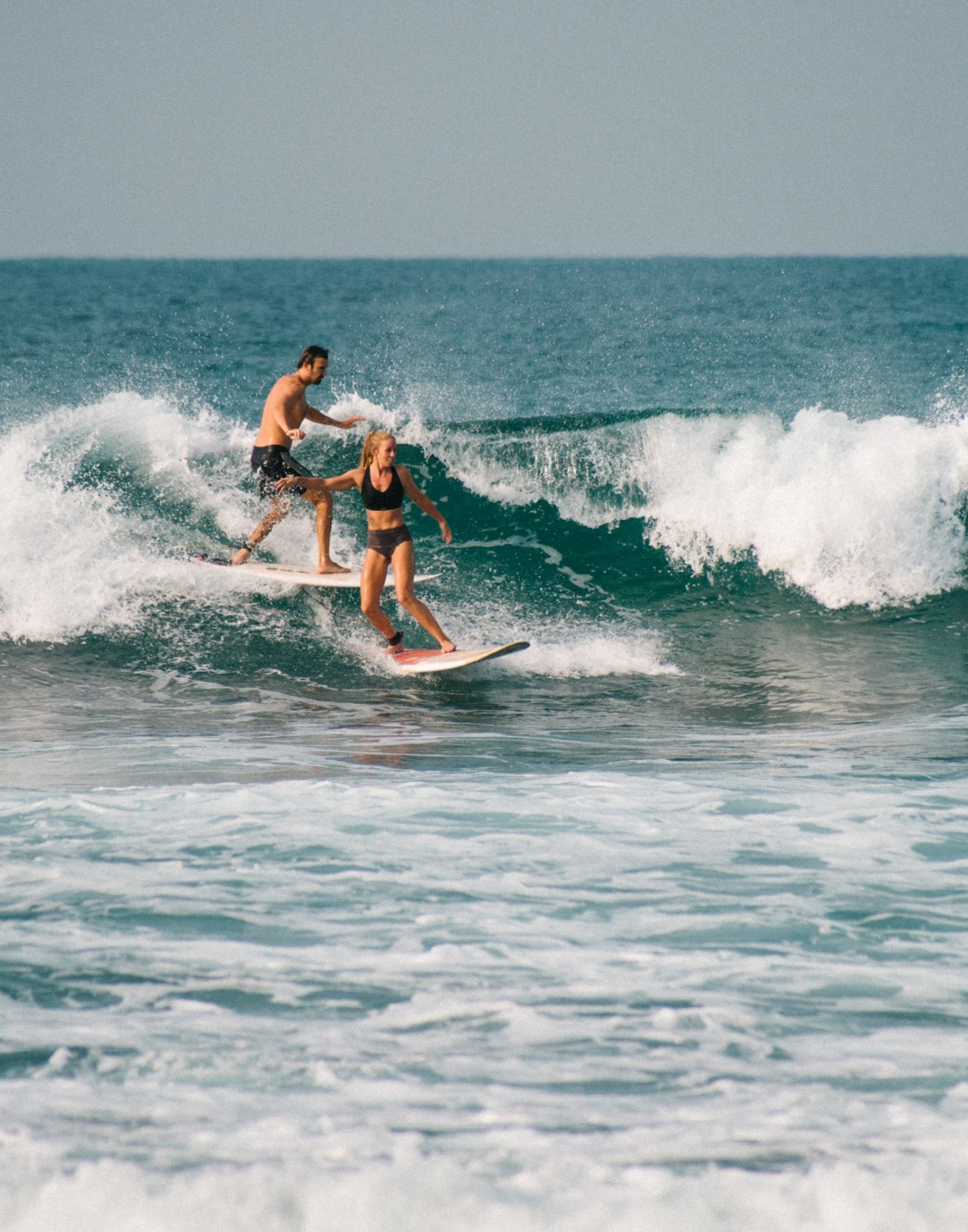
Do Surfers Run Into Each Other? 5 Common Reasons (+8 Tips)
-
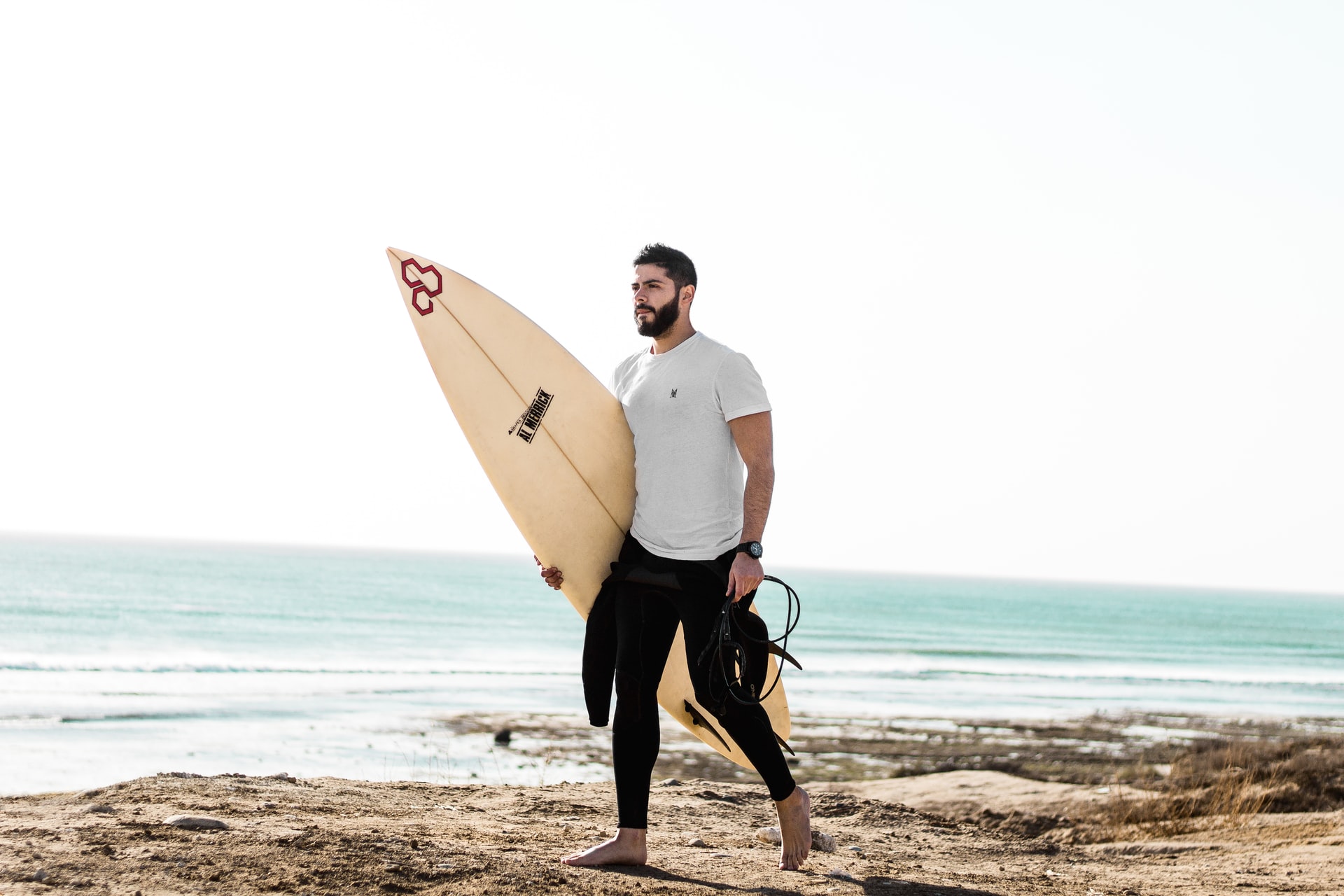
Do Surfers Have Beards? Pros & Cons You Should Know (+4 Tips)
-
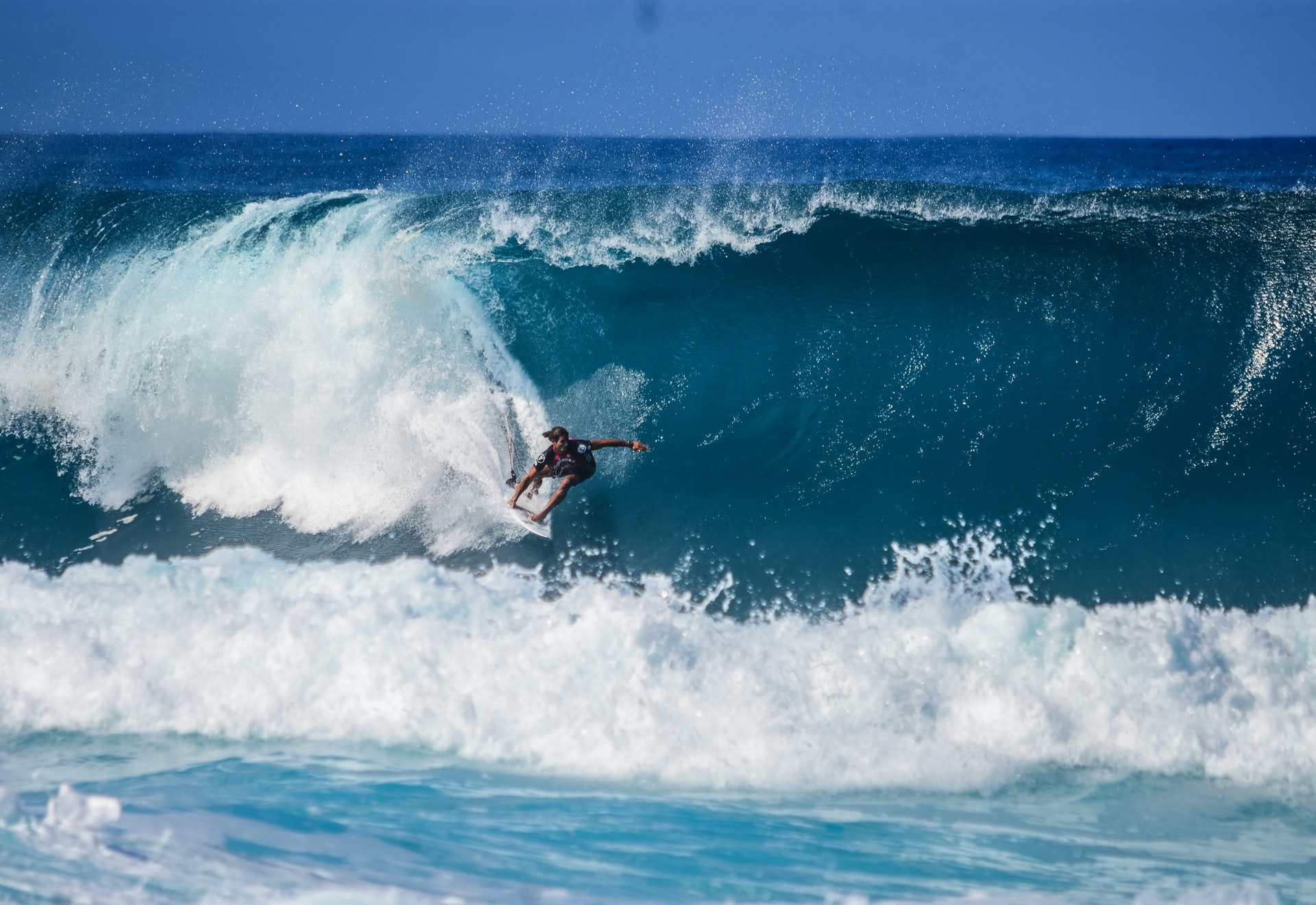
Do Surfers Like Constructive or Destructive Waves? (+Pros & Cons)
-
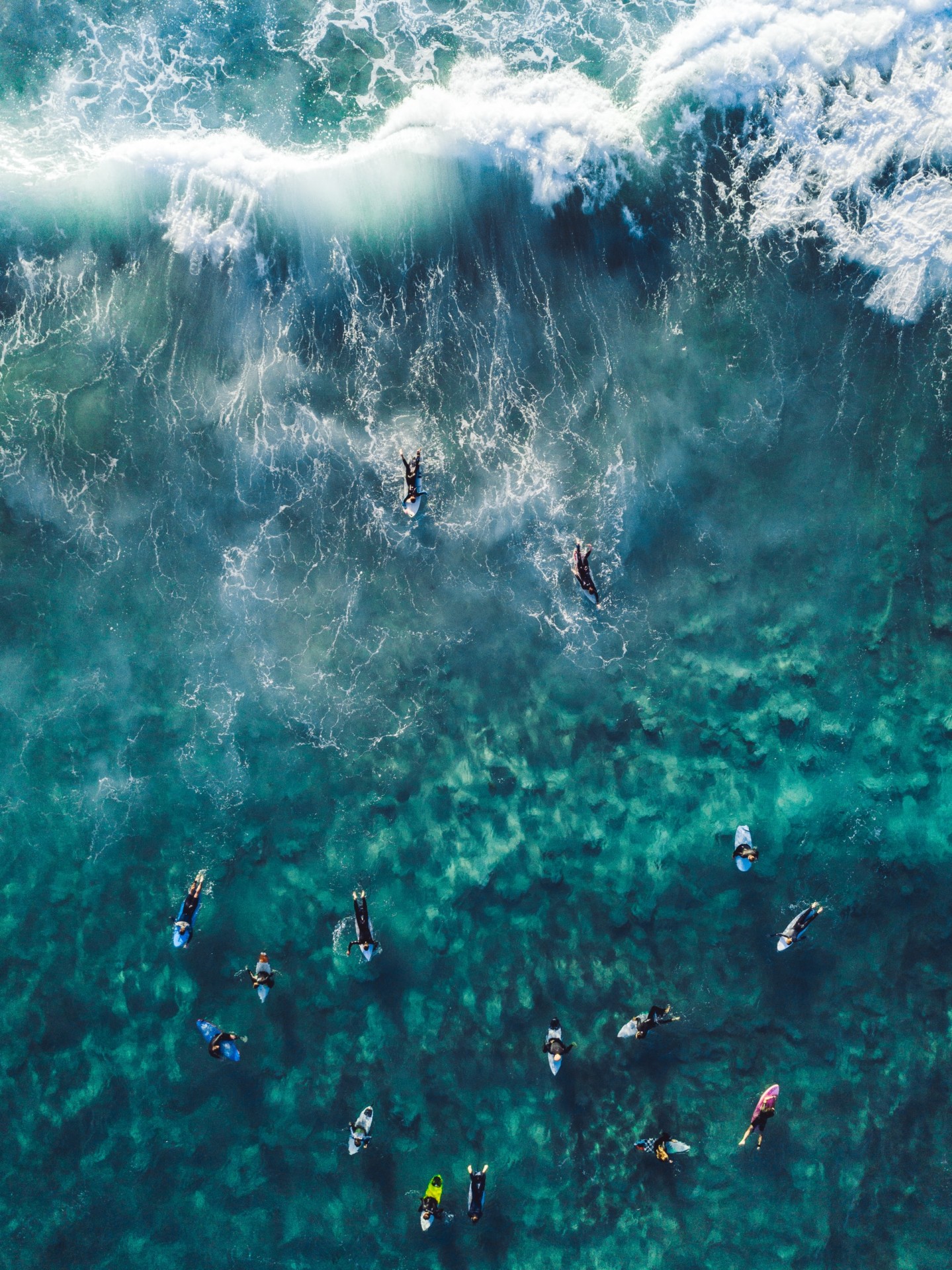
How to Surf Safely: 34 Crucial Tips (Every Surfer Should Know)
-
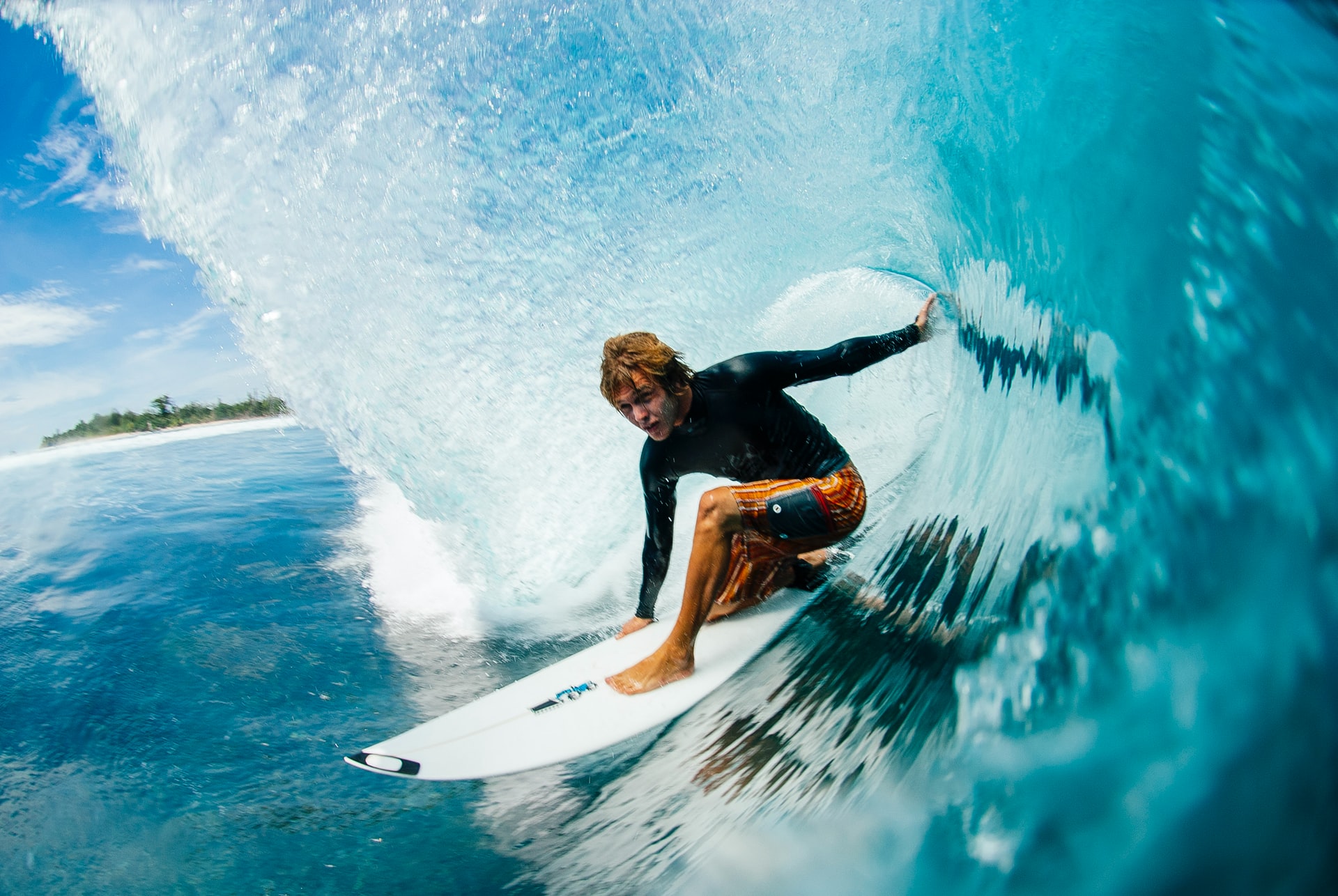
Do Pro Surfers Use Leashes? (+6 Reasons Why You Should Too)
-
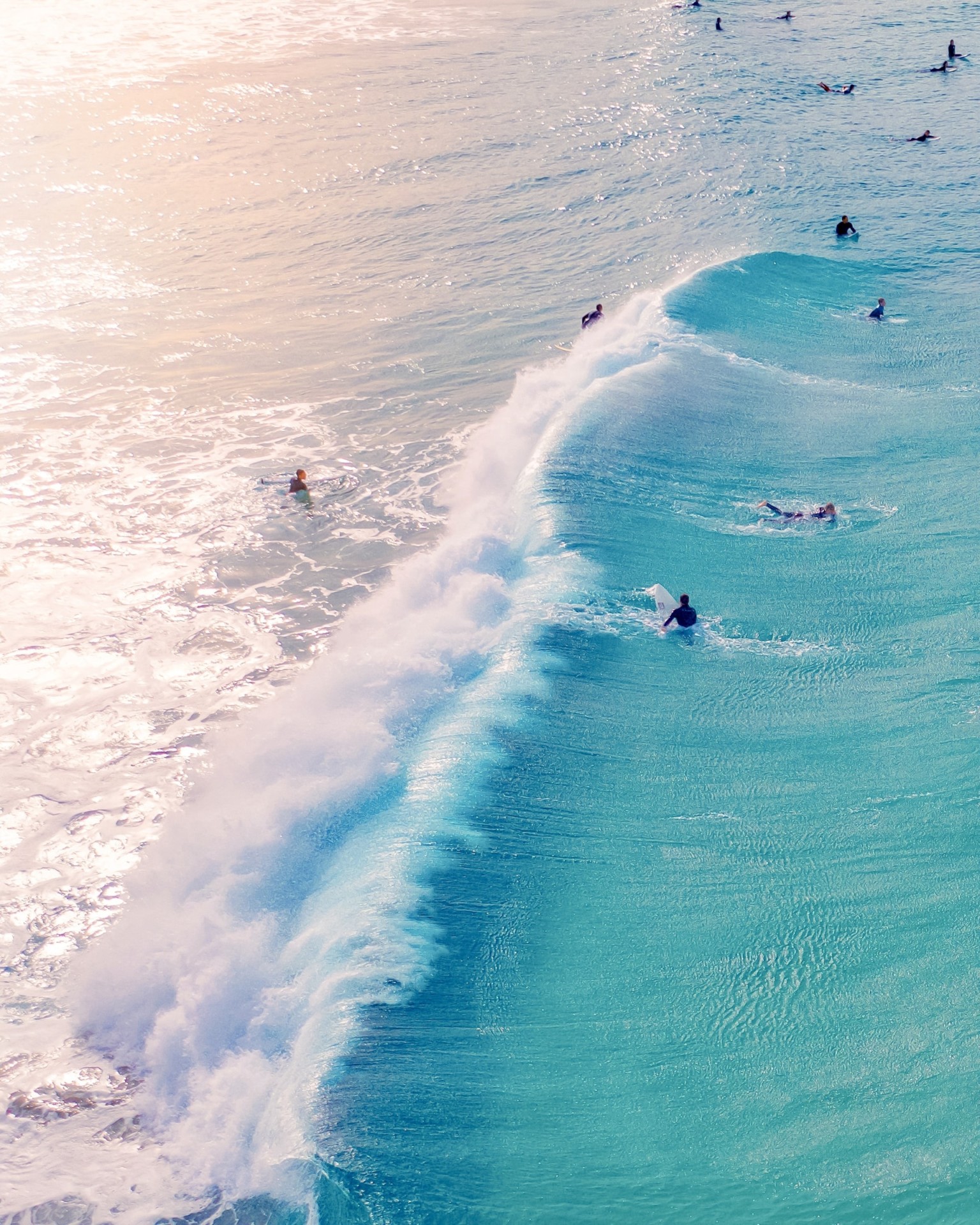
Do Many Surfers Drown? Here Are the Facts (+4 Common Reasons)
-
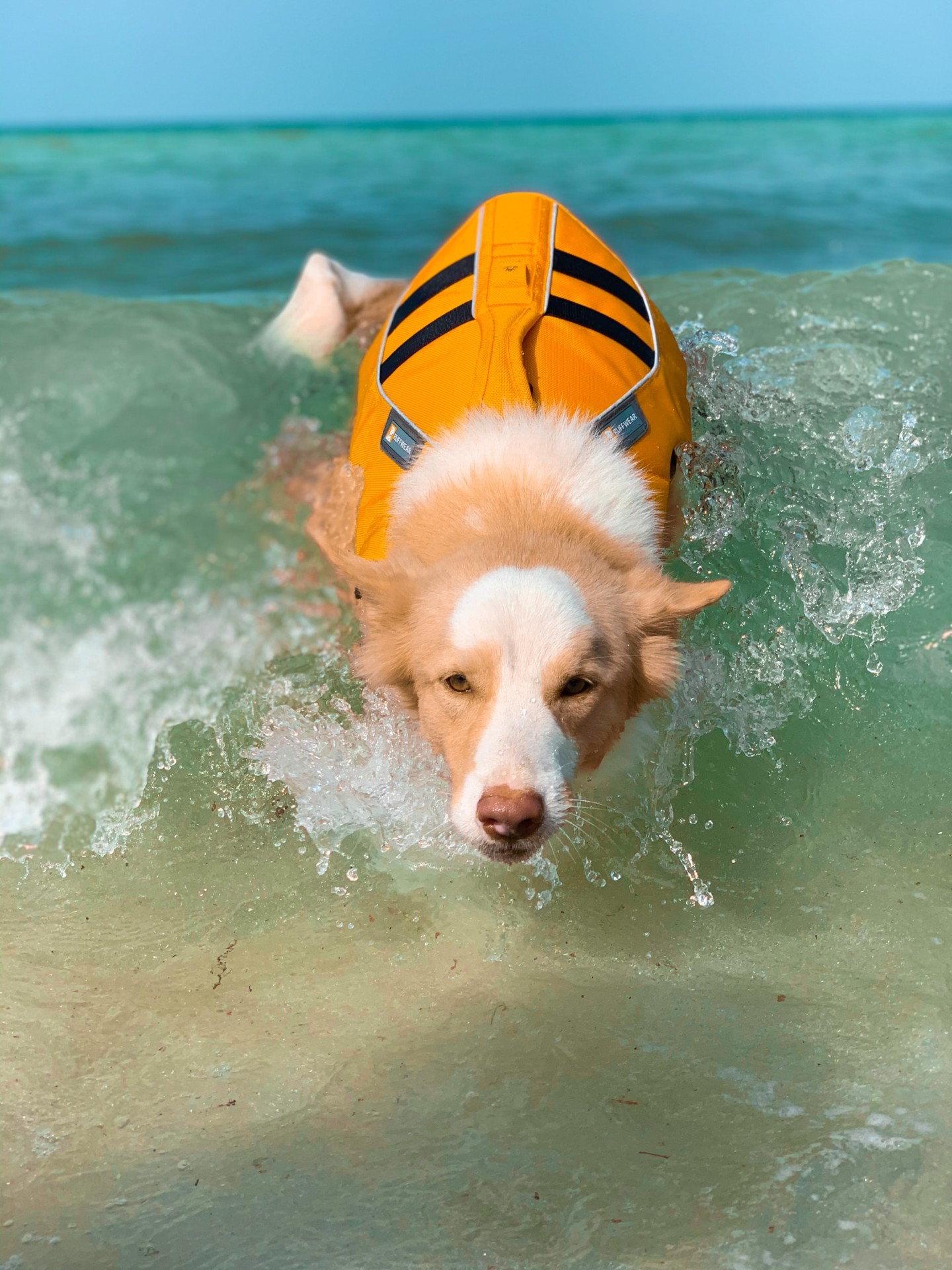
Do Surfers Wear Life Jackets? (7 Reasons Why They Don’t)
-
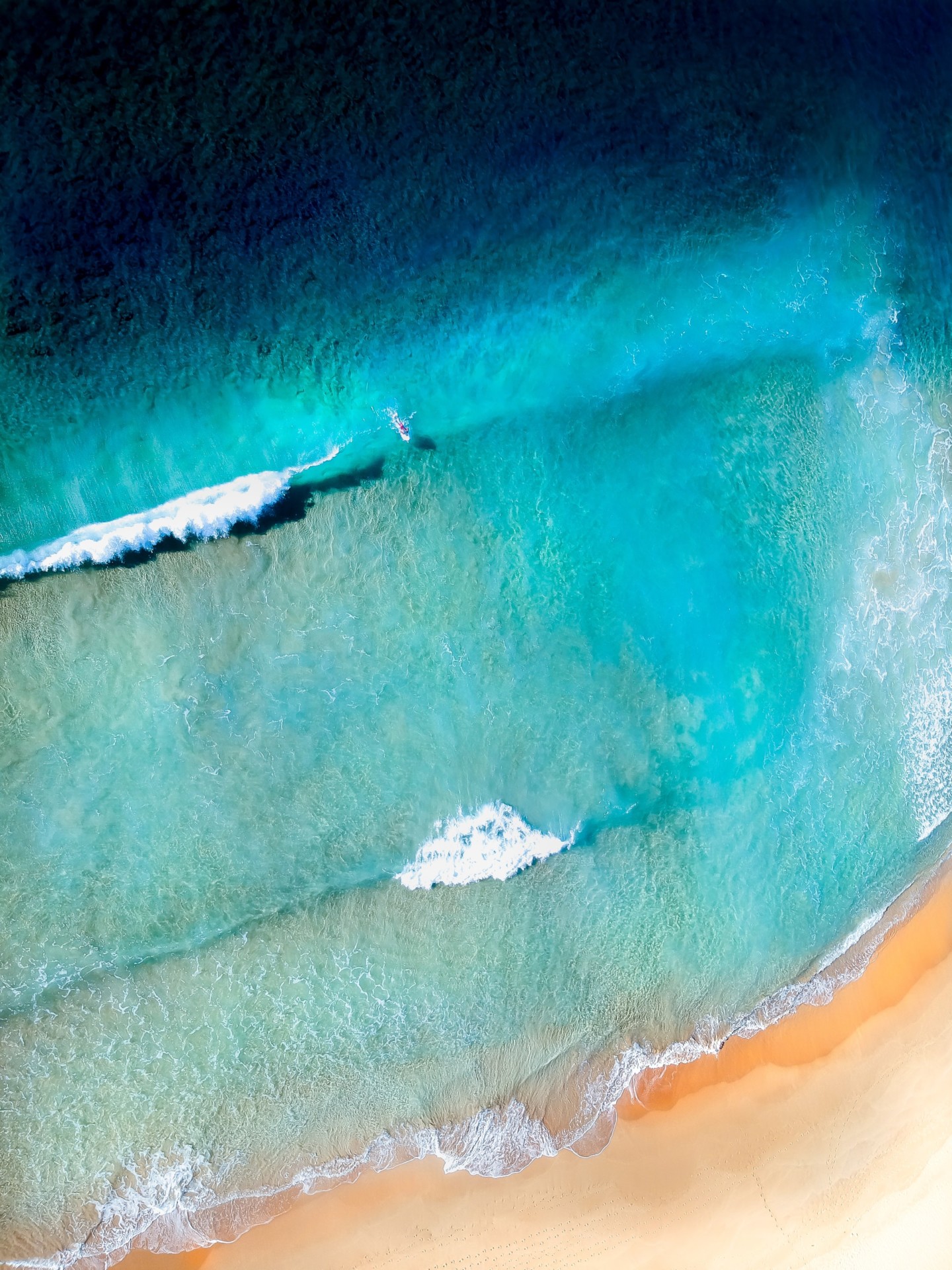
Do Surfers Like Rip Currents? (& How to Use Them Safely)

